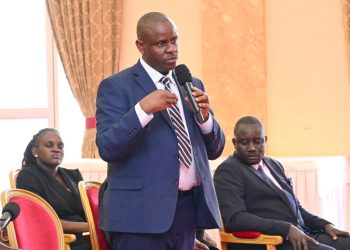Uganda’s earnings from oil and gas will be used strictly for the establishment of critical infrastructure to drive the economy, President Yoweri Museveni has maintained.
Addressing delegates at the first Uganda-Tanzania Business Forum held at the Julius Nyerere International Convention Centre in Dar-es-Salaam on Friday, the President reiterated that the much- anticipated oil revenues would not be used for consumption.
“Under my leadership, money from oil will not be used for consumption or salaries. Why? Because it is a resource that is exhaustible and finite. One day, there will no longer be oil. That is why I insisted that money from these resources should only be used to create durable capacity for the Ugandan economy namely; build power dams, irrigation schemes, railway, scientific innovations and some aspects of education,” he said.
Uganda has an estimated 6.5 billion barrels of oil, about 1.7 billion of which is recoverable, and the Government has been preparing for commercial production, previously slated to start in 2020.
Tanzania has also made some oil discoveries and the two neighbours are preparing to build a $3.5b 1,443km-long oil pipeline to transport oil from Uganda to Tanga port in Tanzania.
Keen to allay anxieties and tame excitement about the potential benefits from the lucrative resource, Museveni said Uganda would use its earnings for infrastructure to drive economic growth.
The private sector in Uganda and Tanzania has been preparing to tap into the largescale cross-border projects in oil and gas, infrastructure and trade and investment. Museveni, who was accompanied by the First Lady and Minister of Education and Sports and several other ministers and officials, said Uganda was open to trade and investment.
He, however, said the Government would no longer borrow expensively for projects in electricity, railway and development finance since they affect the cost of doing business. Tanzania’s President John Pombe Magufuli decried the low volume of trade between the two countries which enjoy a long history of social, cultural and political ties.
He said Ugandan businesses were open to set up in Tanzania in numerous fields and contribute to the growth of the two countries’ economies.
The volume of trade between Uganda and Tanzania is about $355.6m (about sh1.3 trillion), foreign affairs minister, Sam Kutesa, said, quoting the Uganda Bureau of Statistics figures.
The Uganda-Tanzania Business Forum sought to allow the private sector to network, explore investment opportunities across borders, identify and present challenges to policymakers.
Key on the agenda were discussions around the removal of trade barriers, including tariffs charged on Ugandan goods entering Tanzania, work permit fees and export quotas.
The concerns were discussed during the joint permanent commission held at the levels of government officials, permanent secretaries and ministers from both countries.
































































